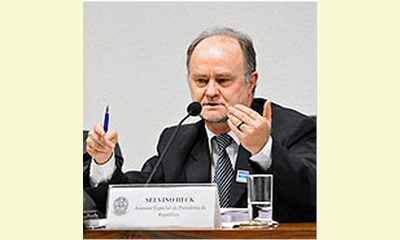|
|
No reason to fear the people: Participatory budgeting in Brazil
un article par Selvino Heck, special advisor to the General Secretariat of the Presidency
I've seen this in a film 25 years ago. Olívio Dutra e Tarso Genro, vice
mayor of Porto Alegre, elected in the wake of Diretas-Já and
Constituency in 1988, proposed the process of Participatory
Budgeting (PB). There was backlash from the conservative majority
of the City Council and sections of the media and public opinion. 
Selvino Heck
click on photo to enlarge
The essence of the PB is to listen to people in public meetings for
preparation and prioritization of programs and articles that guide
the municipal government in the making of the municipal budget.
The Participatory Budget Council, formed by society, organizes the
collective demands of the citizens and refers them to the
government which, in turn, forwards them to the Board of Aldermen
who have the last word on the public budget.
In 2014, Participatory Budgeting, the successful experiment created
in Porto Alegre in 1989 and now reproduced in 3000 cities around
the world in dozens of countries, was hailed in the plenary of the
14th Conference of the International Observatory of Participatory
Democracy that took place in Canoas Rio Grande do Sul, 3-5 June
with over a thousand participants from 25 countries. Said Dutra,
hailed in the plenary as the father of Participatory Budgeting,
"Participatory Budgeting arose from the need to discuss the revenue
generated in Porto Alegre, not only in the urban area of the capital
but also in the countryside. It was necessary to include citizens in
the process. That meant to the role of government not only to
receive their input, but also to distribute it. The Budget needed to
give voice to those who hitherto had not either time or voice.
Participatory Budgeting is the way to achieve a society with justice,
equality and respect, but centered on human dignity."
(It should be noted, as a historical record, that the peoples' wisdom,
contrary to the expectation of many city managers, selected as the
top priority asphalting streets of neighborhoods and villages,
especially where the bus passed, instead of health centers or
schools. People did not want to step in the mud in the winter cold,
and they wanted quality of life at their doorstep.)
The criticisms and reactions to PB in 1989 and 1990 were similar to
the criticisms we hear today against the National System of Political
and Social Participation, released on May 23 through Decree 8243
signed by President Dilma Rousseff "for the purpose of
strengthening and promoting mechanisms and democratic forms of
dialogue and joint action between government and civil society."
It was said in Porto Alegre, and it is said today about the Decree of
social participation: "They are replacing the Board of Aldermen,
which has lost its meaning and importance"; "This Decree is an
aberration. It is an effrontery to bypass the Legislature, with a
mailing box and resonance of the society. It seems you want to
create a parallel power"; "This decree is a setback for democracy in
Brazil. It's a death sentence to the Legislature"; "The decree paves
the Road to Serfdom."
To the contrary, nothing is more republican and democratic that to
encourage social participation and dialogue between governments
and society.
(This article is continued in the discussion board)
( Click here for the original Portuguese article.)
|








|
DISCUSSION
Question(s) liée(s) à cet article:
Participatory Budgeting, How does it work?
* * * * *
Commentaire le plus récent:
In addition, councils, conferences and other bodies have long existed and are consolidated in the Constitution in Brazilian democracy. As Minister Gilberto Carvalho said, "Councils have existed in Brazil since 1937 and Conferences since 1941. We have more than 4000 Brazilian city councils at work. They assist the mayor. They counsel the child and adolescent services, health and environment services. The new Decree regulates and stimulates the expansion of what already exists. We are not creating anything new, this is a regulatory decree. "
To put it in the words of the jurist Peter Abramovay: "These councils will help the people to exercise their democracy. . ... continuation.

|
|









